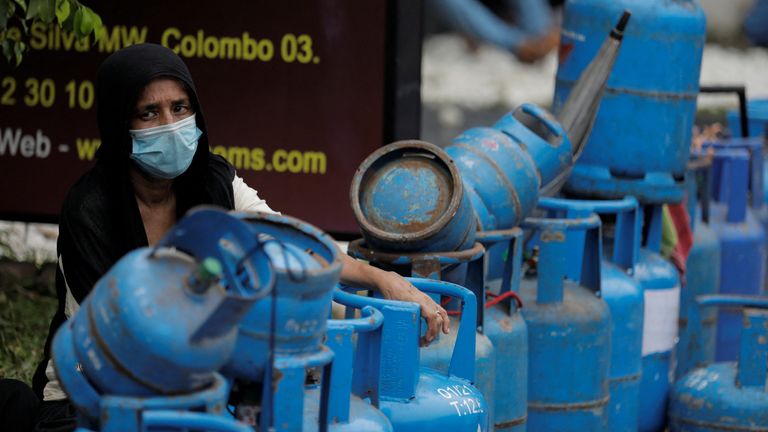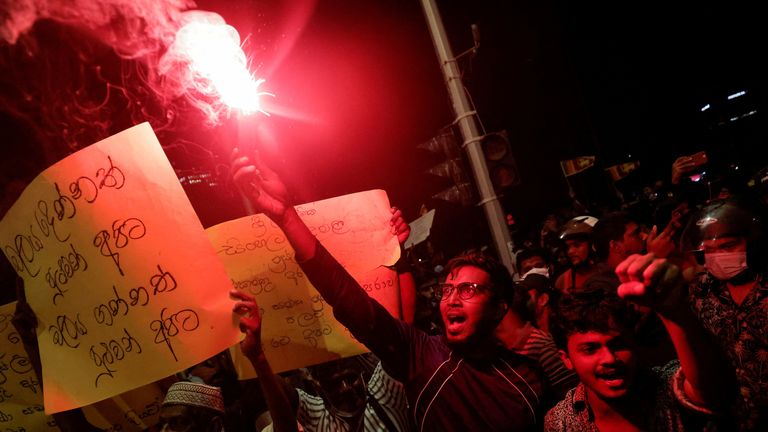[ad_1]
Since it won independence from the British Empire in 1948, Sri Lanka has never defaulted on its sovereign debt, even during the three decades during which the island state was torn apart by a vicious civil war that claimed tens of thousands of lives.
Yet concerns are rising that, such is the country’s plight, this proud record looks likely to fall.
Sri Lanka has appealed to the International Monetary Fund for emergency financial support which, thanks partly to representations from neighbouring India, looks likely to be forthcoming. It is seeking up to $4bn (£3bn) to enable it to make payments on its outstanding debts and to enable it to import essential items.
Some $1bn (£769m) is due in July alone, when a bond falls due for repayment, while analysts at JP Morgan have estimated that in total Sri Lanka’s debt servicing costs this year will come to around $7bn (£5.4bn).
The country suspended payments on its debt last week after admitting it had become “impossible” to do so.
Sri Lanka has total debts of around $35bn (£26.9bn), of which some $12.6bn (£9.7bn) is in the form of government bonds that have been sold to foreign investors, with Japan and China owning around one-fifth of it on their own.
That debt is now trading at around 40 cents to the dollar and the ratings agencies Moody’s and S&P Global have both downgraded Sri Lanka’s credit rating in recent days.
The request for support comes as the country’s economy continues to deteriorate. There have been shortages of food, fuel, medicine and other essentials while power cuts have been rife and staples such as rice and sugar have had to be rationed. Street protests have been the inevitable upshot.
Inflation, predictably, has let rip and now stands north of 20%. The central bank, which has just changed its governor amid the crisis, raised its main deposit rate from 6.5% to 13.5% and its main lending rate from 7.5% to 14.5% in response.
So how did Sri Lanka, a country rich in mineral resources like limestone and phosphate and a prolific producer of agricultural commodities such as tea, rice and rubber, find itself in such a parlous state?
The answer is that there are both long and short term factors.
The country has suffered from economic mismanagement over a number of years by successive governments and, in particular, a decision in 2009 at the end of the civil war to focus on production for domestic markets rather than export markets.
This was in spite of the fact that Sri Lanka is a country that depends heavily on imports – making it all the more important that it had a strong export sector in order to raise foreign currency reserves.
Another factor has been the projects that the debt helped finance. Much of this, particularly money lent by the Chinese, is thought to have been channelled into large infrastructure projects of debateable economic value.
An example is the deep water port opened in November 2010 in Hambantota on the south coast of Sri Lanka. Although the port is now the country’s second largest, after Colombo, the cargo volumes it has handled were insufficient to meet the cost of construction.
The port is now owned by Chinese companies.
The current government of President Gotabaya Rajapaksa also stands accused of having compounded the crisis.
It pushed through unaffordable tax cuts in 2019 that damaged the government’s finances while, in April last year, it banned the use of chemical fertilisers in an attempt to cut the country’s dependence on imports – Sri Lanka previously imported up to $400m (£308m) worth of chemical fertiliser annually – and to meet an election promise to become the world’s first ‘organic economy’.
The upshot was a poor paddy crop, with rice production down by between one quarter and one third. The decline in the production of tea, a key export earner for Colombo, was even greater.
All of these problems were then compounded by the pandemic, which hammered tourism, another key foreign currency earner.
Mr Rajapaksa, in a response to his government’s unpopularity, on Monday unveiled a cabinet reshuffle in which two of his brothers and one of his nephews was removed from the ministerial line-up, although another brother, Mahinda, himself a former president, remains in place as prime minister.
The big concern has to be that, even if the IMF comes to the rescue on this occasion, additional measures will need to be taken.
The IMF, which appears to have been heavily influenced on this occasion by New Delhi’s representations, tends to attach strict conditions to its support and further austerity, possibly in the form of cuts in public spending and pay freezes for public sector workers, looks inevitable.
The bigger question is how many emerging economies will suffer a similar fate. Sri Lanka is far from being the only Asian or African country that has become heavily indebted to China after allowing Beijing to plough vast sums into its infrastructure via its ‘Belt and Road’ programme.
Nearby Pakistan, where Imran Khan’s government has just fallen, is another.
The after effects of the pandemic, not to mention the mayhem the war on Ukraine has caused in commodity markets, mean Sri Lanka will not be the last to suffer this kind of upheaval – even if some of its problems have been self-inflicted.
[ad_2]





